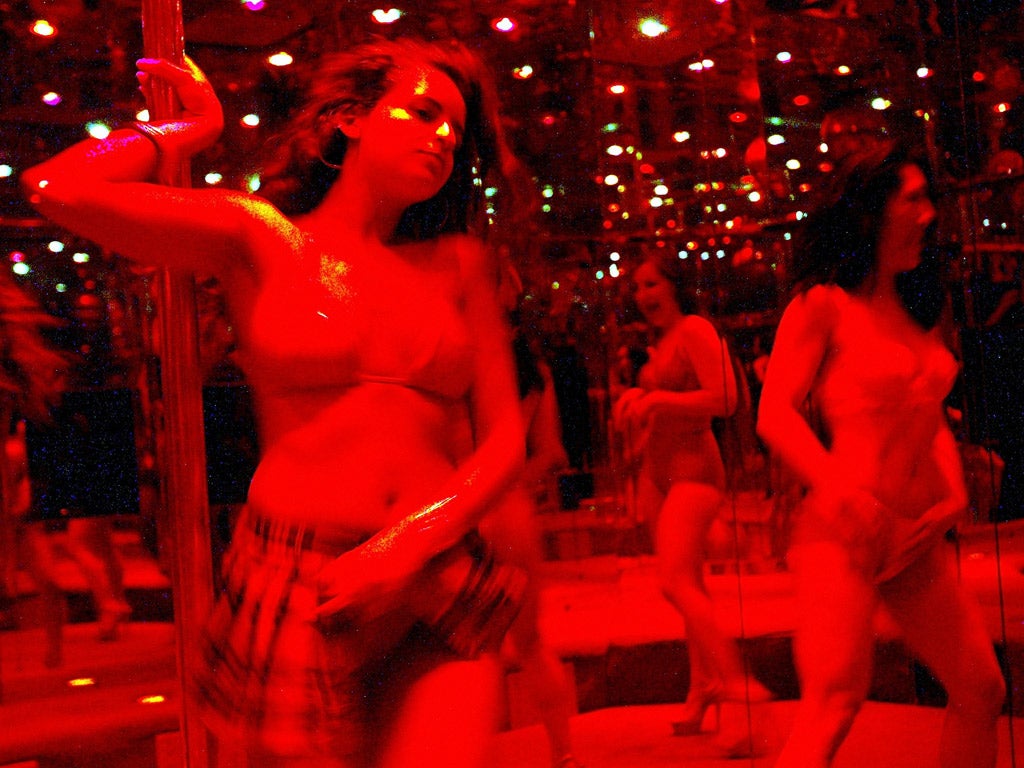Your support helps us to tell the story
From reproductive rights to climate change to Big Tech, The Independent is on the ground when the story is developing. Whether it's investigating the financials of Elon Musk's pro-Trump PAC or producing our latest documentary, 'The A Word', which shines a light on the American women fighting for reproductive rights, we know how important it is to parse out the facts from the messaging.
At such a critical moment in US history, we need reporters on the ground. Your donation allows us to keep sending journalists to speak to both sides of the story.
The Independent is trusted by Americans across the entire political spectrum. And unlike many other quality news outlets, we choose not to lock Americans out of our reporting and analysis with paywalls. We believe quality journalism should be available to everyone, paid for by those who can afford it.
Your support makes all the difference.Things that are bigger in Texas include its strip bars, judging by the Men's Club of Houston, which occupies dimly-lit premises measuring no less than 26,000 sqft, and employs dozens of female entertainers with ample proportions.
Sadly, for the proprietor of this and other nearby gentlemen's establishments, local authorities are about to force them to shoulder the burden of what will become one of the adult entertainment industry's largest and most punitive "sin" taxes. Houston council voted this week to levy a $5 fee on patrons who crosses the threshold of the city's 30 licensed strip bars. The money will be ring-fenced and put towards analysing forensic evidence collected from rape victims.
Supporters of the so-called "pole tax" argue that lap-dancing clubs must shoulder some of the financial burden of rape investigations – on the grounds that their businesses help foster misogynistic attitudes towards women, which can lead to sexual assaults. "There are negative secondary effects associated with adult-entertainment establishments," Ellen Cohen, the council member behind the ordinance, told The Wall Street Journal. It was passed by 14votes to one.
Ms Cohen and her colleagues hope that revenue from the fee will help reduce the time it takes police laboratories to properly analyse "rape kits," the name given to packets containing hair, blood and other samples that may contain DNA evidence, which are routinely taken from alleged victims of sexual crimes.
In common with many cash-strapped US cities, Houston lacks the funds to properly support crime labs, and has a backlog of 6,000 unprocessed rape kits. The "pole tax" will generate around $3m each year, supporters estimate.
The ordinance stipulates that the fee also applies to bars and night-clubs which offer one-off events that could be construed as sexually explicit, such as wet T-shirt contests or "naked sushi contests", in which revellers are invited to eat raw fish off the body of a nude woman.
The patrons of Houston's strip-clubs now face a double-whammy: in addition to the city's tax, they already have to pay a $5 fee to the state of Texas when visiting an adult venue, thanks to a law passed in 2007.
That fee, also dubbed the "pole tax", was recently upheld by the State Supreme Court, after exotic dancers filed a lawsuit claiming that it violated free speech rights by inhibiting a mode of self-expression.
Tax-raising has in recent times become anathema to legislators in Tea Party-infused cities such as Houston. But a fee attached to adult entertainment appears to pass muster with the right, even in Texas: if there's one thing Republicans claim to hate more than big government, it's sexual promiscuity.
The adult industry is nonetheless lobbying hard against the fee, arguing that it represents an unnecessary burden on job-creating businesses at a time of economic strife. "You are going to rip the economic rug out from underneath" the clubs, Angelina Spencer of the Association of Club Executives, a strip-club trade group, told reporters.
Albert Van Huff, a Houston lawyer who represents strip clubs, told the Journal that the tax is based on flawed logic. "There is no known correlation between people going to nice, high-end gentlemen's clubs and rape," he said.
But Jack Christie, a council member who voted for the levy, said he doubted it would destroy the strip clubs. "When you look at videos and see women putting $5, $10 and $20 bills in their remaining clothing, I don't think a $5 tax will hurt anybody."

Join our commenting forum
Join thought-provoking conversations, follow other Independent readers and see their replies
Comments